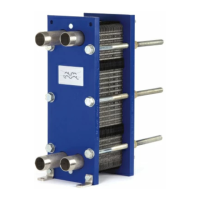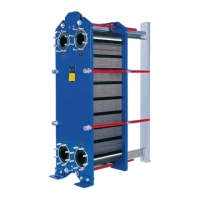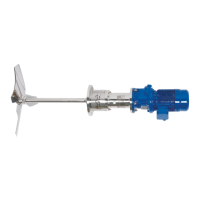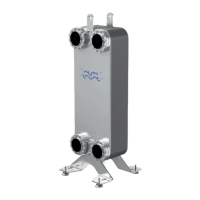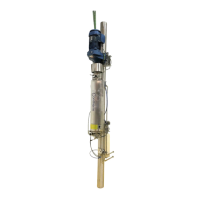Installation
Elbow
To make i t easier to disconnect the heat exchange r, an elbow should be fitted to the connection
in the pressure plate, di rected upwards or sideways , and with another fl ange located just outside
the cont our of th e heat exchang er.
Shut-off v alve
To be able to open the heat exchanger, shut-off valves should b e provided in all connections.
Connection
Different types of connections can be used to connect the piping system to the apparatus.
Fl anged co nnections can be attached with either pin bolts or headed bolts.
Avoid excessive loads from the piping system.
M ake sure the pipe connections a re securely held when working on the pipings.
Caution!
Turnin g of the connections will damage the gaskets on the end plate and caus e leakage.
Note!
Using head ed bolts require careful measuring to ensure that the bolts get the correct
engaged threaded length into the frame pl ate and the m inimum eng agement length
(min) are stated in th e PHE drawing. The maximum engagement threade d length (max)
in the frame plate is limited, refer to th e PHE drawing.
The engaged threaded length must be maintain ed within the limits for the tightened
heat exchanger.
Caution!
Failing to achieve correct engaged threaded length for headed bolt may result in
leakage, damage to the frame p late and injury to personnel
Connections in the pressure plate
It is important that the plate pack has been tightened to the correct dimension A (check against
the PHE drawing) before the piping sy stem is connected.
When ope ning the heat exchanger, the pressure plate must be moved. Do not use fixed pipes or
other p arts lik e feet, fasteners etc. inside the shaded area.
Drip tray (optional)
Depending on the type of fluid in the h eat exc hanger and the type of installation, a drip tray
(drainage b ox) may be necessary to avoid injury to personnel and damage to equipment.
Note!
Put the drip tray in place before positioning the h eat exchanger.
Docum
en t ID
Langu
age
Editi
on
12 Instruction Manual - Plate Heat Excha ngers 3490010217 EN 2016-06
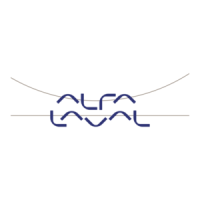
